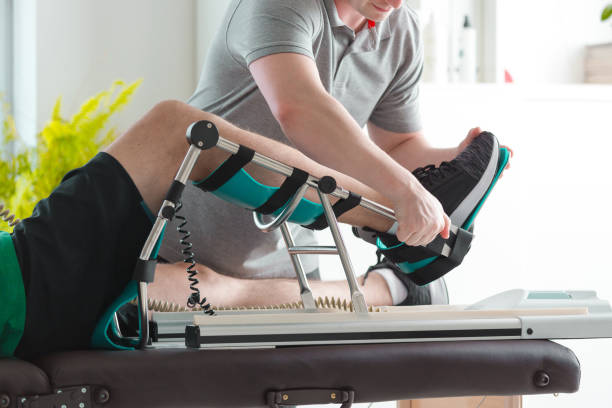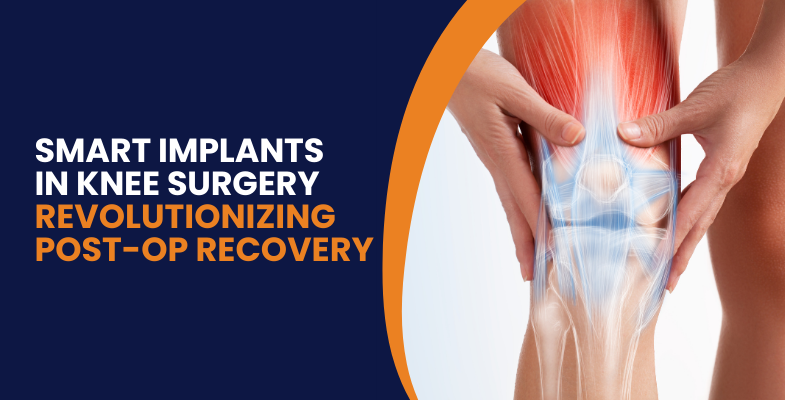Our knees support us through every step, jump, and movement we make. Maintaining their health is crucial not just for mobility, but also for overall independence and quality of life. Unfortunately, knee injuries and osteoarthritis are increasingly common—globally, over 600,000 knee replacement surgeries are performed each year, with India contributing more than 1.5 million procedures annually.
Dr. Dharmaraj Yadav, an accomplished Orthopaedic Surgeon at Terna Hospital, Navi Mumbai, shares:
“Smart implants are transforming the way we approach knee surgeries. By continuously monitoring the joint after surgery, these devices allow us to tailor rehabilitation plans to each patient’s unique needs. Early detection of misalignment or unusual stress patterns can prevent complications and help patients regain mobility faster.”
At Terna Hospital, our orthopedics team integrates advanced technology and compassionate care to ensure every patient’s recovery is safe, efficient, and personalized.
Let’s see what exactly makes these implants so revolutionary…
What Are Smart Implants in Knee Surgery?

Orthopedic technology smart implants are advanced knee replacements equipped with tiny embedded post-operative monitoring sensors that collect real-time data about the joint’s function. Unlike traditional implants, which rely solely on periodic check-ups, smart implants continuously monitor:
- Joint movement and flexibility
- Weight distribution across the knee
- Post-surgery alignment and load
Dr. Muzammil Shiraz Shaikh, a seasoned Joint Replacement surgeon at Terna Hospital, Navi Mumbai, explains:
“These sensors give us insights we never had before. We can observe how a patient’s knee behaves under normal daily activity, adjust therapy plans accordingly, and even predict potential issues before they become serious. It’s like having a GPS for recovery—constantly guiding the process toward optimal results.”
With this technology, patients and surgeons are no longer limited by clinic visits alone—recovery becomes a continuously monitored, proactive process.
Concerned whether smart implants could be right for your knee replacement? Consult an expert orthopedist to discuss tailored treatment options.
You might be wondering—what real difference can these tiny post-operative monitoring sensors make once the surgery is over? Let’s dive into the key benefits patients experience during recovery.
Benefits of Smart Implants in Knee Surgery Recovery

Patients and doctors alike benefit from the smart technology integrated into modern knee implants. Here’s how:
Continuous Monitoring: post-operative monitoring sensors track movement patterns and detect irregular stress, reducing the risk of complications.
Faster Recovery: Real-time data allows physiotherapists to adjust exercises, ensuring patients regain mobility efficiently.
Fewer Hospital Visits: Remote monitoring minimizes the need for repeated in-person check-ups.
Personalized Rehabilitation: Therapy plans can be customized based on individual data, not generic recovery timelines.
Patient Empowerment: Patients can see their progress and actively participate in recovery, improving motivation and compliance.
Every step of the recovery process can be monitored, measured, and optimized—helping patients regain confidence and mobility sooner.
And how exactly do tiny sensors make such a big difference in recovery? Let’s explore.
The Role of Sensors in Post-Operative Knee Surgery Recovery

Sensors in smart implants are the core of this technology. By collecting real-time information, they provide insights that were previously impossible:
- Track joint movement and angle during daily activities
- Measure weight distribution while walking or climbing stairs
- Alert doctors to irregular stresses that may indicate a problem
Our highly-skilled team of orthopedists in Navi Mumbai elaborates:
“By analyzing sensor data, we can detect subtle issues that might otherwise go unnoticed until pain or swelling appears. Early adjustments to exercises, activity levels, or medical interventions can prevent setbacks and shorten recovery time significantly. Patients feel safer knowing their progress is closely monitored.”
Curious about how smart implants can help you regain knee function faster? Talk to an orthopaedic surgeon to understand your options.
Real-time monitoring is only the beginning. Let’s see how smart implants are changing the landscape of knee replacement surgeries altogether.
How Smart Implants Change the Landscape of Knee Replacement Surgery
Smart implants knee recovery represent a paradigm shift in orthopedic care. Here’s why:
Data-Driven Decisions: Surgeons receive actionable information, allowing precise adjustments in rehabilitation.
Predictive Insights: Patterns in sensor data can indicate potential complications, enabling preemptive interventions.
Patient-Centric Care: Recovery is no longer generic; each patient receives a customized plan based on actual joint behavior.
Improved Outcomes: Fewer complications, faster return to activity, and enhanced long-term joint function.
Eminent Orthopaedic Specialist Dr. Dharmaraj Yadav notes:
“Smart implants empower both patients and healthcare providers. By continuously monitoring joint performance, we reduce uncertainty and can intervene early. This technology transforms knee replacement from a one-time surgery into an ongoing, data-guided process that maximizes recovery potential.”
With all these sensor-equipped knee implant advantages, you may still have questions about who should get smart implants and what the recovery journey looks like. Let’s address the most common concerns.
Are smart implants suitable for everyone undergoing knee surgery?
While beneficial for most patients, suitability depends on individual health and surgical requirements. A thorough evaluation with an orthopaedic surgeon is essential.
How do smart implants help in the recovery process?
They provide continuous monitoring of joint movement, alignment, and load, allowing therapists to adjust exercises and interventions in real time.
Can I track my recovery with a smart implant after surgery?
Yes, patients can access their progress data, which helps them understand improvements and stay motivated.
Are there any risks associated with smart implants in knee surgery?
As with any implant, risks include infection or device malfunction. These are minimized through proper surgical technique and careful post-operative care.
How long does it take to recover from knee surgery with a smart implant?
Recovery varies individually, but smart implants help optimize rehabilitation, potentially shortening recovery time compared to traditional implants.
Want to explore how smart implants can improve your knee surgery recovery? Consult an expert orthopaedic surgeon to learn about personalized treatment plans.
References:
https://cabellhuntington.org/services/orthopedics/joint-replacement/smart-knee-implant
Disclaimer: The information shared in this content is for educational purposes only and not for promotional use.

